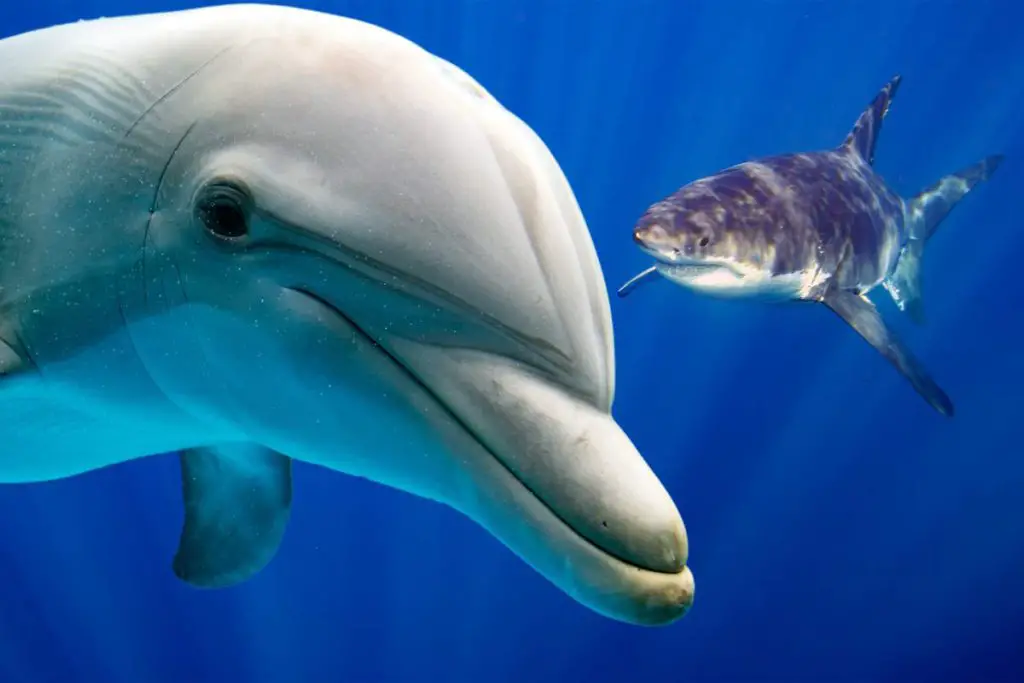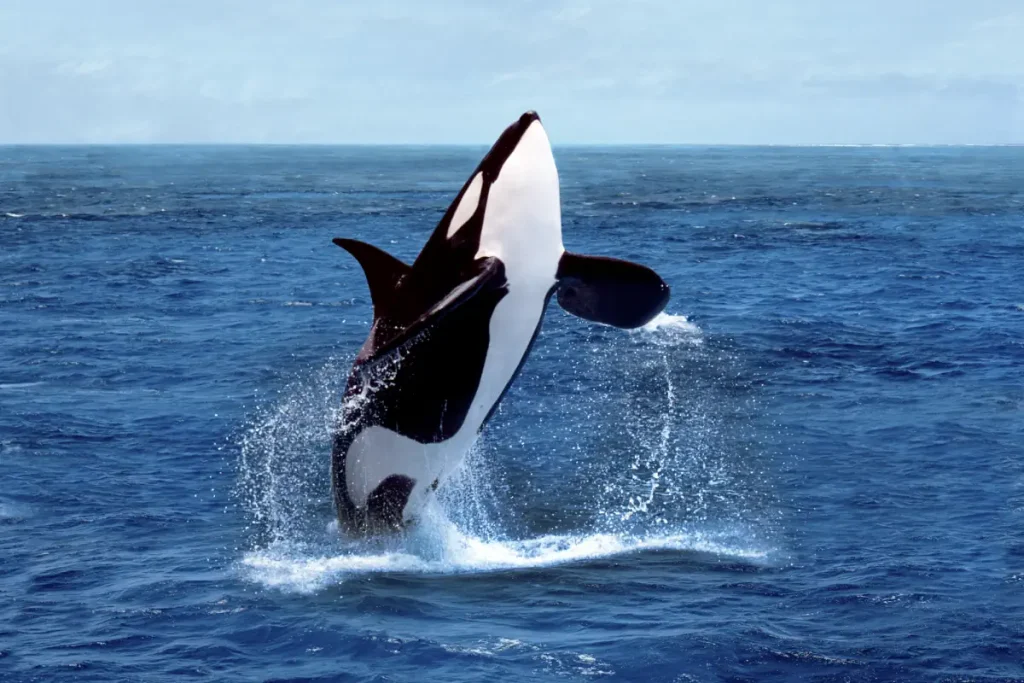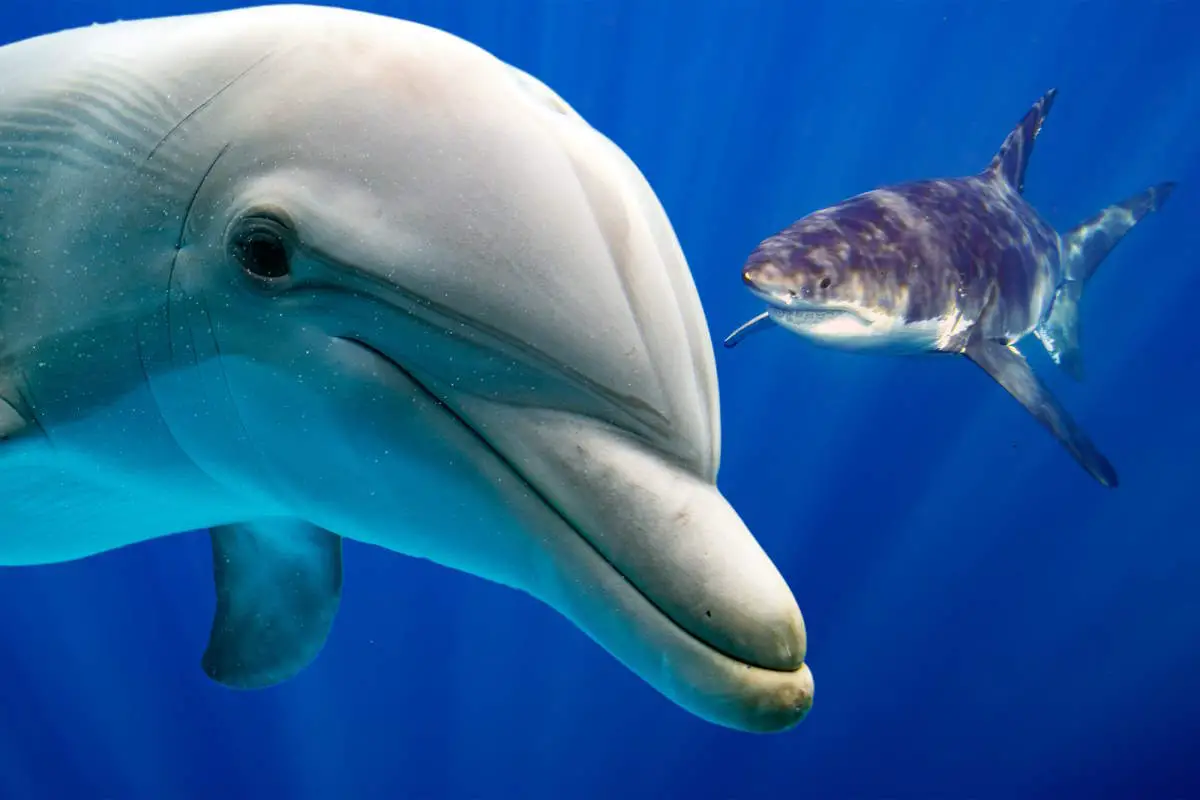When it comes to the marine food chain, sharks are often perceived as the apex predators, ruthlessly ruling the ocean’s depths. Their fearsome reputation, however, doesn’t make them invincible. Contrary to what many might assume, sharks have been known to fear dolphins, a fascinating aspect that begs the question, “Why are sharks afraid of dolphins?” Actually, sharks can hunt dolphins, especially when they catch them alone, but there are circumstances where they retreat. This article will explore this complex predator-prey relationship, taking a closer look at the intricate dynamics between these two marine creatures.
Shark vs Dolphin
Despite their seemingly innocent and playful demeanor, dolphins (we’re talking about common bottlenose dolphins here) hold a deadly secret that sends chills down the spine of the fiercest creature in the ocean – the shark. We’re talking about the large, predatory sharks here, for example, the mighty great white shark. Most shark species are harmless, even the greatest one, the whale shark.
Although many perceive sharks as the apex predators of the seas, largely due to movies like Steven Spielberg’s 1975 film “Jaws”, they actually cause around 10 human fatalities and injure 70 people annually. For comparison, dogs cause around 30-50 fatalities yearly in the United States alone.
Dolphins, a family of aquatic mammals, are mostly found in the tropic zones’ warm waters, with a few exceptions. Of the 36 species alive today, most prefer to avoid the cold. Their bodies are designed for speed and maneuverability, with a large dorsal fin, a pair of flippers, and a powerful horizontal tail, enabling them to reach speeds of up to 30 kilometers per hour in short bursts and leap up to nine meters out of the water’s surface.
Unlike fish, dolphins are mammals and breathe regular air. They need to surface periodically to inhale air through a single nostril atop their head, known as a blowhole. This feature allows them to dive back down for up to ten minutes, but most dolphins surface to breathe around two to three times a minute. Interestingly, dolphins have to consciously remember to breathe, which makes their sleep very peculiar. While half of their brain rests, the other half stays alert to enable the dolphin to continue breathing and look out for dangers in the environment.
In stark contrast to sharks, which are solitary hunters, dolphins are incredibly social and highly intelligent creatures. They live, hunt, communicate, and even mate in groups called pods. When a member of the pod is in danger, the other dolphins rush in to protect their friend. Their group dynamics, coupled with their agility and superior intellect, often give them an upper hand against sharks. Dolphins understand shark anatomy and know exactly where to strike to inflict the most damage. They typically aim for a shark’s gills or soft underbelly, using their hardened snouts to deliver blows that can cause extensive internal damage or even kill the shark.

Despite dolphins’ prowess, sharks can and do prey on dolphins that are separated from their pod or are engaged in “crater feeding”, where they dig for small fish and crustaceans with their snouts buried in the sand. Nonetheless, sharks generally avoid encounters with dolphin pods.
Apart from protecting their own, dolphins have been known to put themselves between hungry sharks and human divers, encircling the humans until the shark leaves the vicinity. They have even rescued people from drowning, demonstrating their remarkable intelligence and the special bond they share with humans. However, this bond can sometimes take an odd turn, as seen in a tourist spot in Varadero, Cuba, where dolphins are known to mount floating platforms and people.
Do dolphins kill humans?
Sadly, there have been instances where dolphins have killed humans, particularly when they felt threatened or were being antagonized. For example, in 1994 in Sao Paulo, Brazil, two men who attempted to ride and harass a dolphin ended up getting repeatedly headbutted, resulting in one man’s death due to internal bleeding.
While dolphins can pose a threat when provoked, they remain largely friendly towards humans, often going out of their way to protect us from sharks. This unique characteristic of dolphins justifies their reputation as man’s aquatic best friend.
Shark vs Killer Whale

Scientifically, killer whales (orcas) are also dolphins. They are the largest species in the dolphin family.
Towering over most shark species, orcas often reach up to 32 feet (9.75 meters) in length and can weigh up to 6 tons. Their impressive size, paired with their exceptional intelligence and cooperative hunting techniques, make them formidable adversaries.
What makes orcas, especially threatening to sharks is their knowledge of shark anatomy and their unique hunting strategies. For instance, orcas have been known to induce tonic immobility in sharks by flipping them upside down, which causes temporary paralysis and renders the shark defenseless.
Furthermore, orcas are known to target and consume the livers of sharks, a nutrient-rich organ. They achieve this with a precise, powerful strike with their tail, which can stun or even kill the shark. Once the shark is incapacitated, the orca can easily remove and consume its liver.
Consequently, sharks have developed a strong instinctual fear of orcas and will typically flee an area (sometimes hundreds or even thousands of kilometers/miles) if they sense the presence of these top predators.
Sources
- Dolphin on Wikipedia
- Orca on Wikipedia
- Great white shark on Wikipedia
- Moon Landings: All-Time List [1966-2025] - February 2, 2025
- What Is Max-Q and Why Is It Important During Rocket Launches? - January 16, 2025
- Top 10 Tallest Rockets Ever Launched [2025 Update] - January 16, 2025

